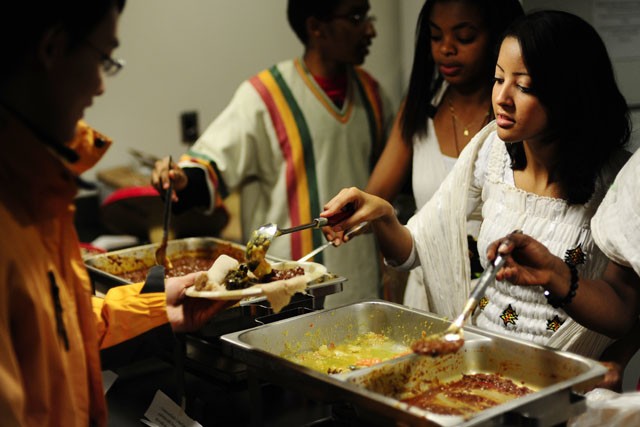EthiopiaâÄôs coffee history came alive last week at the University of Minnesota at the Small World Coffee Hour.
At FridayâÄôs edition of the bi-weekly event, sophomore Emnet Fikru explained that many years ago, a shepherd in Kaffa, Ethiopia noticed his donkey becoming more energized after eating a certain plant.
The shepherd sampled the plant and felt the same boost of energy. He passed information along to the monks, who used the plantâÄôs effects to stay awake while praying at night.
Eventually this became the drink so many rely on each morning.
Ethiopia is just one of many countries that have claimed the discovery of coffee, but Fikru argued it had to originate in Ethiopia because of the role coffee plays in the nationâÄôs cultural identity.
Students at the University have celebrated cultures this way since 1990, when six students got together to teach each other about different cultures in the world. While the idea of the events has been consistent, the number of attendants has ballooned.
Today, more than 250 students gather every two weeks to continue the tradition.
Freshly brewed Ethiopian coffee wafted out of the groupâÄôs usual meeting place in the Yudof Hall Club Room last week, while the sounds of Ethiopian music filled the air.
This event, put on by the Ethiopian Student Association, featured traditional food and dancing, a presentation of an Ethiopian coffee ceremony and displays of Ethiopian outfits.
“This was a chance for us to show off [EthiopiaâÄôs] diversity,” ESA co-president Lidiya Girma said. “We are bringing cultural awareness to the U of M.”
This was the last event of the fall semester for SWCH.
Each SWCH typically entails an entertainment component of traditional music and dancing as well as an educational element, where the students teach the geography, economy, history or anything else they want other students to understand, SWCH program coordinator Jeong Rok Oh said.
Each week, ethnic restaurants from around the Twin Cities provide typical food from the country in question.
Of course, thereâÄôs never a shortage of coffee.
University student Ana Moraru has come to almost every SWCH event this semester because she sees it as a great opportunity to learn.
“I would not have known what a coffee ceremony was,” Moraru said. “ItâÄôs really nice that people from a country can share their culture with the rest of us.”
SWCH is funded by International Student and Scholar Services, which pays each of the six board members $1,000 each semester for their time spent working on events.
The money for the food each week is provided by a grant from the Student Activities Office and varies in cost depending on the culture.
ISSS member Thorunn Bjarnadottir described the goals of the SWCH as two-fold.
“It is meant to be a place for people to have a conversation and understand each other,” she said, “but it is also to have a safe place for international students to hang out.”
She also said she is not expecting the group to grow any more than it already has, and she prefers it that way. She wants to keep the group at an intimate number, though she is pleased more American students are getting involved.
“Years ago it was always 80 percent international students and 20 percent Americans, now we are at 40-60,” she said.
SWCHâÄôs next event will be Jan. 21 and will hone in on the culture of Mongolia.



Dave
Sep 9, 2024 at 1:59 am
Why are they called Ethiopians?
It seems historically incorrect.